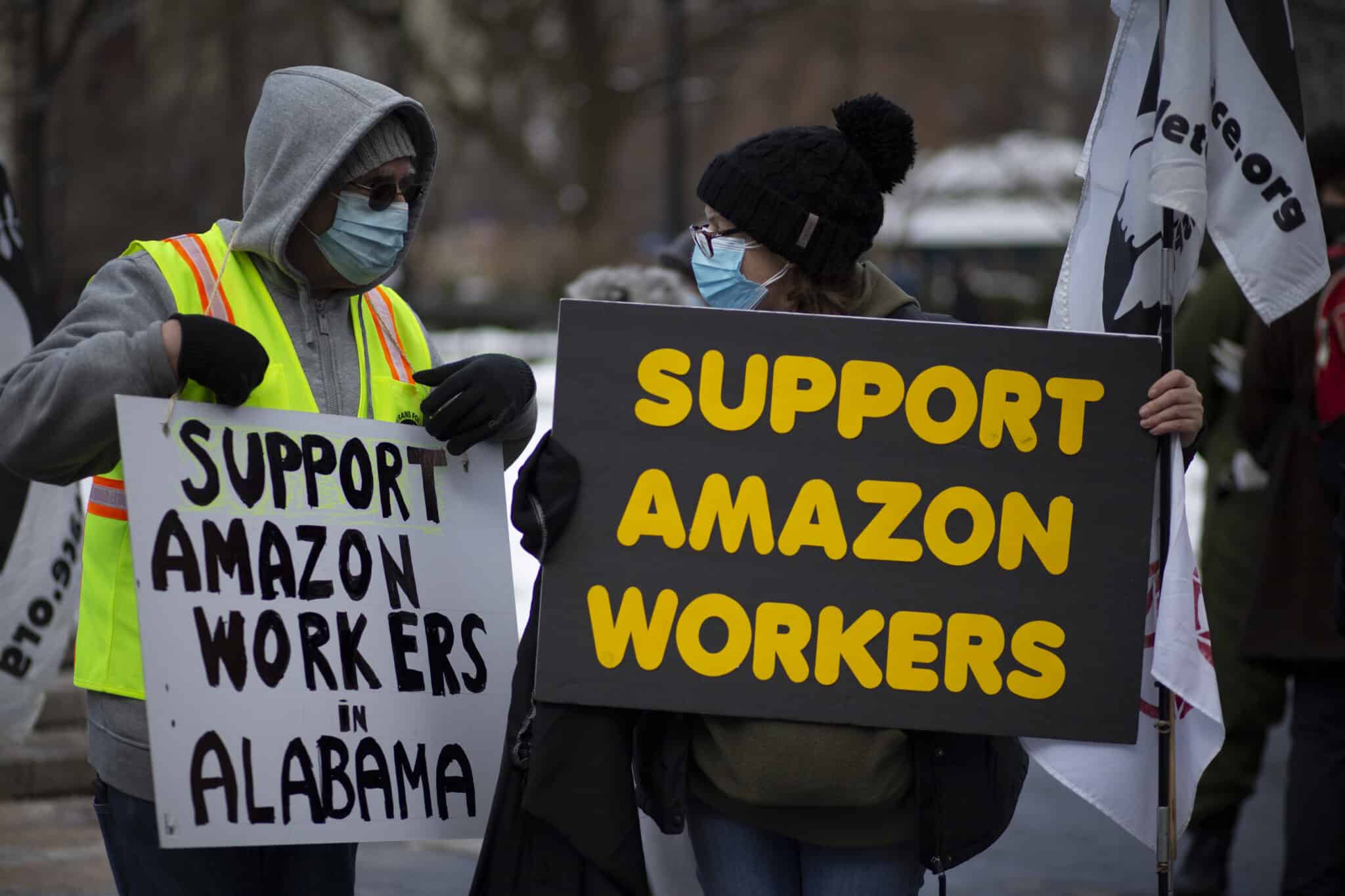
Swap Agrawal is a student at Harvard Law School.
In this weekend’s news and commentary, Amazon announced a new policy on building access that organizers say will hamper unionization drives; a labor contract covering 22,000 West Coast port workers expired; and Atlantic City’s largest casino workers’ union announced a tentative agreement with four casino resorts, averting a strike of over 4,500 employees.
On June 30, Amazon announced a new policy preventing off-duty warehouse workers from accessing the company’s facilities. Specifically, workers can no longer access buildings or other working areas on their scheduled days off, before their shifts, or after their shifts. Organizers at Amazon say that the policy, which was shared with workers on Amazon’s internal app, is aimed at hampering unionization drives. “On our days off, we come to work and we engage our co-workers in the break rooms,” said Rev. Ryan Brown, an Amazon worker who is aiming to organize the company’s warehouse in Garner, North Carolina. “This was a direct response to that, to try to stop organizing by any means necessary,” Brown said. Angelika Maldonado, the chair of Amazon Labor Union’s Workers Committee, has also said that in order to organize the JFK8 warehouse, “[she] tried to be in the building as long as [she] could,” including “coming in on [her] days off.” Amazon spokesperson Kelly Nantel said that the new policy was motivated by safety concerns and stressed that it does not prevent off-duty employees from engaging their co-workers in “non-working areas” outside the company’s buildings.
On July 1, a labor agreement covering 22,000 port workers on the West Coast expired, adding pressure to high stake talks between employer group Pacific Maritime Association (PMA) and the International Longshore and Warehouse Union (ILWU). Last November, the ILWU declined an offer to extend the contract until July 2023. The current pact was originally set to end in 2019, but was lengthened after roughly two-thirds of union members voted to do so in exchange for higher wages and pensions. When the contract expired, so did its “no strike” clause, but PMA and ILWU said in a joint statement that normal operations will continue at the ports until an agreement can be reached. The union has significant bargaining leverage, as major ports in Los Angeles and Long Beach are still struggling with the supply chain impacts of the pandemic during busy summer months. Moreover, port disruptions would add to inflationary pressures that have hurt President Biden’s approval ratings ahead of critical midterm elections. The White House had been helping mediate talks, but if negotiations fail, Biden could rely on the Taft-Hartley Act to enforce an 80-day “cooling-off period.”
On June 30, UNITE HERE Local 54, Atlantic City’s largest casino workers’ union, announced that it reached a tentative agreement with four casino resorts covering 4,500 employees ahead of a July 1 strike deadline. Last month, UNITE HERE members had voted 96% yes on a proposal to authorize a strike at these casinos. “Over the years, casino workers have sacrificed wage increases for the health of the industry,” UNITE HERE said in a June 14 statement about the contract negotiations. “Workers have persevered through casino closures, Hurricane Sandy and a global pandemic. Now, they’re falling behind. As industry’s profits and gaming revenues surpass pre-pandemic levels, wages for Atlantic City’s casino workers have not kept pace.” The union also released a report earlier this year on the struggles casino workers are facing and the need for a raise. The union’s worker negotiating committees at MGM-owned Borgata, Caesars, Harrah’s, and Tropicana casinos approved the agreements and will soon set a date for a ratification vote from the entire membership. However, a July 3 strike deadline remains in effect for Hard Rock Casino.






Daily News & Commentary
Start your day with our roundup of the latest labor developments. See all
February 24
In today’s news and commentary, the NLRB uses the Obama-era Browning-Ferris standard, a fired National Park ranger sues the Department of Interior and the National Park Service, the NLRB closes out Amazon’s labor dispute on Staten Island, and OIRA signals changes to the Biden-era independent contractor rule. The NLRB ruled that Browning-Ferris Industries jointly employed […]
February 23
In today’s news and commentary, the Trump administration proposes a rule limiting employment authorization for asylum seekers and Matt Bruenig introduces a new LLM tool analyzing employer rules under Stericycle. Law360 reports that the Trump administration proposed a rule on Friday that would change the employment authorization process for asylum seekers. Under the proposed rule, […]
February 22
A petition for certiorari in Bivens v. Zep, New York nurses end their historic six-week-strike, and Professor Block argues for just cause protections in New York City.
February 20
An analysis of the Board's decisions since regaining a quorum; 5th Circuit dissent criticizes Wright Line, Thryv.
February 19
Union membership increases slightly; Washington farmworker bill fails to make it out of committee; and unions in Argentina are on strike protesting President Milei’s labor reform bill.
February 18
A ruling against forced labor in CO prisons; business coalition lacks standing to challenge captive audience ban; labor unions to participate in rent strike in MN